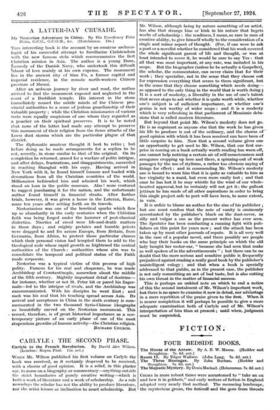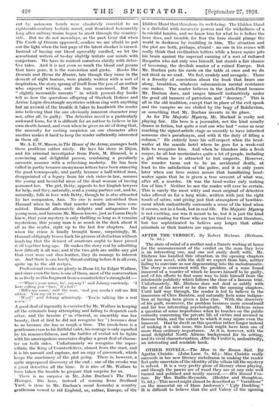FICTION:
FOUR BEDSIDE BOOKS.
Room 13. By Edgar Wallace. (John Long: 7s. 6d. net.)
The Majestic Mystery. By Denis Mackail. (Heinemann. 7s. 6d. net.) Corms in more robust times were accustomed to "take an ox and hew it in gobbets," and early writers of fiction in England adopted very nearly that method. The menacing landscape, the mysterious groan, the. fisticuff- and the gore -frem throats cut by unknown hands were absolutely essential to an eighteenth-century bedside novel, and flourished honourably long after railway-trains began to snort through the country- side. But we do not nowadays, as the poet Gray did when
The Castle of Otranto appeared, confess we are afraid to put out the light when the last page of the latest shocker is turned.
Instead of having our blood agreeably curdled, we let the sensational _writers of to-day slightly irritate our minds with conjecture. We have to content ourselves chiefly with detec- tive tales. And it is not even so much the blood and groans that have gone, it is the conviction and gusto. Books like
Dracula and Herne the Hunter, late though they came in the descent of night horrors, were plainly written with a sort of
inspiration, the story sprang of itself from the pen of an author who enjoyed writing, and its tone convinced. But the " slightly mercantile accents " in which present-day books
tell us how the querulous offspring of Sherlock Holmes and Arsene Lupin disentangle mysteries seldom ring with anything but an avowal of the trouble it takes to hoodwink the reader
into believing that the one obviously innocent character may not, after all, be guilty. The detective novel is a particularly awkward form, for it is difficult for an author to believe in his own sleuth-hound, and even when he gives an air of doing that, the necessity for casting suspicion on one character after another makes it hard to keep the reader sufficiently interested in them all.
Mr. A. E. W. Mason, in The House of the Arrow, manages both
those problems rather nicely. He lays his story in Dijon, and his criminal investigator from Paris, M. Hanaud, is a convincing and delightful person, combining a peculiarly sarcastic manner with a refreshing modesty. He has been called in partiy because anonymous letters have been annoying the good townspeople, and partly because a half-witted man, disappointed of a legacy from his rich sister-in-law, accuses the young and beautiful niece of the dead woman of having poisoned her. The girl, Betty, appeals to her English lawyers for help, and they, naturally, send a young partner out, and he, naturally, falls in love with Betty, though he is also attracted by her companion, Ann. No one is more astonished than Hanaud when he finds that murder actually has been com- mitted. Hanaud alternately delights and antagonizes the young man, and because Mr. Mason knows, just as Conan Doyle knew, that your mystery is only thrilling so long as it remains mysterious, this young man is as much in the dark about it all as the reader, right up to the last few chapters. And when the crime is finally brought home, surprisingly, M.
Hanaud obligingly traces back his process of deduction without implying that the densest of amateurs ought to have pieced it all together long ago. He makes the story real by admitting how difficult it all was, and if the two girls are unlike any girl that ever wore out shoe-leather, they do manage to interest us. And there is one lovely throat-cutting before it is all over, quite up to the old recipes.
Professional crooks are plenty in Room 13, by Edgar Wallace, and since even the hero is one of them, most of the conversation
is as lively as this fragment from a counterfeiter's stronghold :-
"' What's your name, bo', anyway ? ' said Johnny carelessly. hate calling you "face," it's low !
'Bill's my name,' said the man, and you needn't call me Bill either. You say sir to me.'
'Woof !' said Johnny admiringly. 'You're talking like a real screw.' "
A good deal of ingenuity is exercised by Mr. Wallace in keeping all the criminals busy attempting and failing to despatch each other, and the heroine (" so ethereal, so unearthly was her
beauty, that at first he did not recognize her ") becomes dear to us because she has so rough a time. The crook-hero is a gentleman even to his faithful valet, his coinage is only equalled
by his resourcefulness, and the battles of verbal wit he fights with his unscrupulous associates display a great deal of charac- ter on both sides. Unfortunately we recognize the super- villain, the King of Counterfeiters, almost from the start, and it is his pursuit and capture, not an orgy of guesswork, which keeps the machinery of the plot going. There is, however, a quite unprepared discovery at the end : one of the crooks was a great detective all the time. It is nice of Mr. Wallace to have taken the trouble to prepare that surprise for us.
There is no surprise in Mr. John Buchan's The Three Hostages. His hero, instead of coming from Scotland Yard, is (true to Mr. Buchan's usual formula) a country gentleman vowed to rid England, or, rather, Europe, of the Hidden Hand that threatens its well-being. The Hidden Hand is a diabolist with mesmeric powers and the wickedness of a homicidal lunatic, and we know him for what he is before the hero does, and tremble for fear the hero should plunge the world in darkness by confiding in him. The situation and the plot are both, perhaps, absurd - no one in his senses will really think that civilization totters while a brave squire pits his brain against the supernal cunning of a sort of Cultured Rasputin who not only sees himself, but stands a fair chance of becoming, the devilish master of a ruined Europe. But Mr. Buchan puts his cards on the table at once and we do not think as we read. We feel, crudely and savagely. There is a ferocity of conviction about the book that bears one along, breathless, whatever subconscious mental resistance one makes. The reader believes in the Arch-Fiend because Mr. Buchan does, and ranges himself instinctively under the good old banners of patriotism and " decency." This is all in the old tradition, except that in place of the evil spook and the vampire we are chilled, by the bogy of Bolshevism, or something that Mr. Buchan invents in its place.
As for The Majestic Mystery, Mr. Mackail is really not playing fair. His hero is a journalist, not the kind usually drawn in fiction, but quite a real one who had " come as near reaching the signed-article stage as recently to have inherited someone else's pseudonym, and with it the duty of filling a column." He entirely loses his self-respect when the head- waiter at the seaside hotel where he goes for a week-end fails to recognize him. And when he blunders into a fresh corpse, he all but incriminates quite a lot of people, including a girl whom he is attracted to but suspects. However, the murder turns out to be an accidental death, at least to the satisfaction of the police, and it is only years later when our hero comes across that humiliating head- waiter again that he is given a true account of what was, after all, a murder. Or was the head-waiter only making fun of him ? Neither he nor the reader will ever be certain. This is surely the most witty and most original of detective tales offered us for a long while, written with just the right touch of satire, and giving just that atmosphere of bewilder- ment which undoubtedly surrounds a scene of the kind when it occurs, not in a book, but in real life. The Majestic Mystery is not exciting, nor was it meant to be, but it is just the kind of light reading for those who are too tired to want literature, but too sophisticated to believe any longer that either criminals or their hunters are supermen.







































 Previous page
Previous page